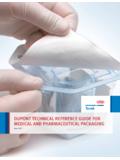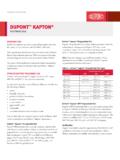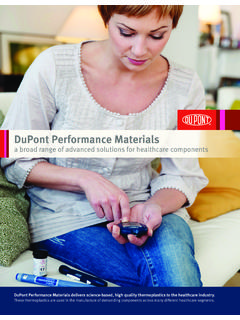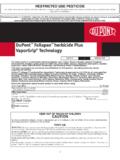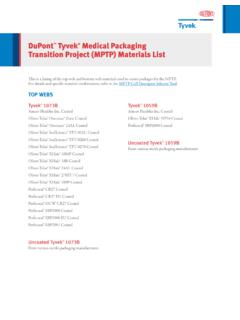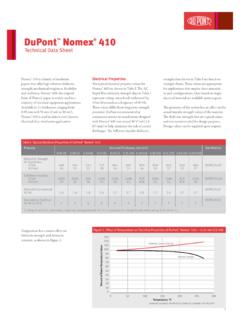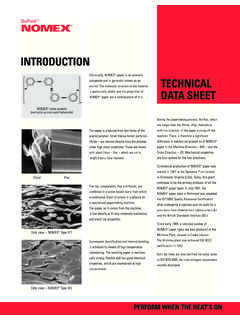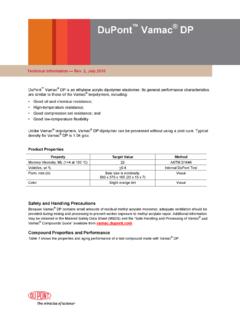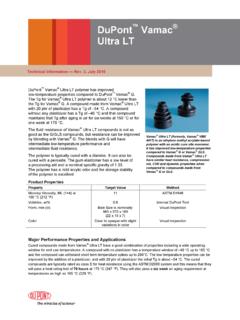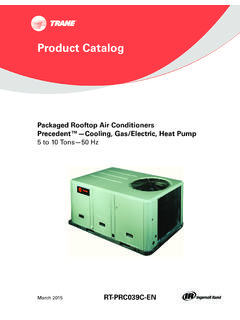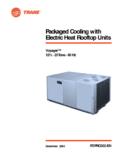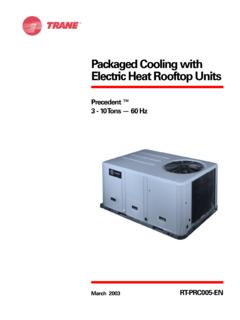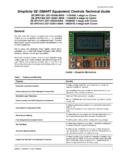Transcription of DuPont Delrin acetal resin Molding Guide
1 TECHNICAL INFORMATIONDuPont Delrin acetal resinMolding GuideiiiiiTable of Contents PagesGeneral Information ..1 Description ..1 Compositions ..1 Safety Precautions to Observe When Molding Delrin acetal Resins ..2 Packaging ..3 Polymer Structure and Processing Behavior ..4 Glass Transition and Melting ..4 PVT Diagrams ..4 Heating-Cooling Behavior ..6 Viscosity and Rheological Behavior ..6 Injection Molding Unit ..8 Screw Design ..9 ELCee Screw for Optimum Productivity ..10 Cylinder Temperature Control ..10 Cylinder Adaptor ..10 Non-Return Valve (Back Flow Valve BFV) ..10 Nozzle ..11 Evaluation of Melt Quality ..11 Molds ..13 Ability to Fill ..13 Gates ..14 Runner System ..16 Nozzle and Sprue ..17 Hot Runner Mold for Crystalline Polymers ..18 Vents ..19 Undercuts ..20 Sharp Corners ..21 Ribs Design ..21 Weld Lines ..21 Mold Maintenance ..22 Mold Cleaning ..22(continued)ivTable of Contents (continued) PagesMolding Process ..23 Start-up and Shutdown Procedures.
2 23 Operating Conditions for Delrin Temperature Settings ..24 Operating Conditions for Delrin Molding Cycle ..26 Optimum Productivity Molding ..29 Standard Molding Conditions for ISO Tensile Bars ..30 Hold Pressure Time via In-cavity Pressure Measurement ..30 Dimensional Considerations ..31 Fundamentals of Dimensional Control ..31 Mold Shrinkage ..31 Factors Affecting Mold Shrinkage ..31 Mold Shrinkage of Filled Resins ..31 Effect of Pigments ..33 Post- Molding Shrinkage ..34 Insert Molding ..35 Annealing ..35 Environmental Changes ..35 Dimensional Tolerances ..36 Auxiliary Operations ..37 Material Handling ..37 Reground resin ..37 Drying ..37 Coloring ..38 Disposal ..38 Troubleshooting Guide ..39 Index .. 421 General InformationDescriptionDelrin acetal resins are semi-crystalline, thermoplastic polymers made by the polymerization of formaldehyde, and are also commonly referred to as polyoxymethylene (POM) . They have gained widespread recognition for reliability in many thousands of engineering components all over the world.
3 Since commercial introduction in 1960, Delrin has been used in the automotive, appliance, construction, hardware, electronics, and consumer goods industries, among others . Delrin is noted for: High mechanical strength and rigidity Excellent dimensional stability Natural lubricity Fatigue endurance High resistance to repeated impacts Excellent resistance to moisture, gasolines, solvents and many other neutral chemicals Toughness at low temperature (down to 50 C [ 58 F]) Wide useful temperature range (in air: 50 to 90 C [ 58 to 194 F], with intermittent use up to 120 C [248 F]) . Good electrical insulating characteristics Ease of fabricationDelrin acetal resins are available in a variety of compositions to meet different end-use and processing requirements .CompositionsThe main available Delrin compositions can be classified as follows:a . Standardb . Toughenedc . Low wear/Low frictiond . Glass filled/Reinforcede . UV-stabilizedThe standard compositions cover a broad range of melt viscosities.
4 The highest viscosity composition, so like Delrin 100P, are often molded when maximum toughness properties are needed . The intermediate melt viscosity Delrin 500P is used for general-purpose injection applications . The resins having lower melt viscosity, Delrin 900P is usually chosen for injection Molding applications with hard-to-fill molds .A summary of the main compositions is shown in Table 1 .Safety Precautions to Observe When Molding Delrin acetal ResinsDelrin as well as many other thermoplastic polymers decomposes to gaseous products when heated for a prolonged time . These gases can generate high pressures if confined . If material is not free to exit from an injection cylinder through the nozzle, it may blow back through the hopper .In the case of Delrin acetal resin , decomposition is almost entirely to gaseous products, so pressure build-up can be rapid . The product of decomposition is formaldehyde .As with any acetal polymer, Delrin , when overheated, can discolor and form gaseous decomposition products, which are largely formaldehyde.
5 Low levels of formaldehyde emissions can also occur at typical processing temperatures . Repeated exposure to formaldehyde may result in respiratory and skin sensitization in some individuals . Formaldehyde is a potential cancer hazard .Processing toughened grades of Delrin can release low levels of isocyanates . Repeated exposure to isocyanates may result in respiratory and skin sensitization in some individuals .Low levels of formaldehyde may occur in the headspace of bags as received or in containers of formed parts after processing . Bags of resin or formed parts should be opened in well ventilated areas .Use adequate local exhaust ventilation in process areas to maintain exposures below recommended control limits . Drop air shots into water to reduce emissions .When Molding Delrin , it is important that the operator be familiar with the factors that can cause decomposition, with the danger signals that warn of this problem, and with the action that should be taken . This information is summarized on a card for display at the Molding machine.
6 The information given here is based on our experience to date . It may not cover all possible situations and it is not intended as a substitute for skill and alertness of the operator .Follow correct start-up, operating and shut-down procedures as described later in this aware of troublemakers causes of decomposition: High temperature sticking temperature controller, faulty thermocouple connections, incorrect reading, burned-out heater or heater with a hot spot, heat surges on start-up . Do not overheat . Maintain polymer melt temperature below 230 C (446 F) . Cycle delay . Avoid prolonged exposure at or above the recommended processing temperature . Recommended melt temperatures are given in Table 5 .2 High Viscosity GradesDelrin 100/II100 POM homopolymer . High viscosity Molding material . Excellent tensile strength and resistance to creep over a wide temperature range, even under humid ambient conditions . High fatigue endurance and impact resistance . Applications: molded parts such as highly loaded gears, plain bearings and snap-fits.
7 Delrin 100P Same characteristics and applications as Delrin 100, plus improved thermal stability for low deposit Molding in demanding processing conditions, e .g ., hot runner tools . Delrin 111P Characteristics: Delrin 100P with enhanced crystallinity . Resistance to creep and fatigue endurance improved over Delrin 100P . Typical applications: Highly loaded gears, bearings, snap-fits .Medium-High Viscosity GradesDelrin 311DP POM homopolymer . Optimized stabilizer formulation with enhanced crystallinity; excellent dimensional stability . Excellent resistance to fuels, lubricants, solvents and most neutral chemicals .Medium Viscosity GradesDelrin 500P POM homopolymer . General purpose Molding resin with improved processing stability for low deposit Molding in demanding processing conditions, e .g ., hot runner tools . Delrin 511P Characteristics: Delrin 500P with enhanced crystallinity, good resistance to creep and fatigue . Applications: fuel system components, gears, fasteners.
8 Low Viscosity GradesDelrin 900P Characteristics: Low viscosity, fast Molding resin plus improved processing stability for low deposit Molding in demanding processing conditions, e .g ., hot runner tools . Applications: Multicavity molds and parts with thin sections, e .g ., consumer electronics parts, zippers .Toughened GradesDelrin 100ST POM homopolymer, Super Tough . High viscosity, super tough material for injection Molding and extrusion . Excellent combination of super-toughness, impact fatigue resistance, solvent and stress crack resistance, as well as high tensile elongation at low temperature . Applications: Mainly used for parts requiring resistance to repeated impacts and loads, such as automotive fasteners, helmets, hoses and tubing . Delrin 100T POM homopolymer, Toughened . High impact resistance . Delrin 500T Medium viscosity, toughened resin for injection Molding and extrusion . Excellent notched Izod and tensile impact strength . Applications: Mainly used for parts subjected to repeated impacts and alternating loads, such as automotive fasteners, helmets, hoses and tubing.
9 Low-Wear/Low-Friction GradesDelrin 100AL High viscosity lubricated grade with package of advanced lubricants . Delrin 100KM Delrin 100 P modified with Kevlar aramid resin for abrasive wear reduction . Applications: Specialty friction and wear . Delrin 500AF Medium viscosity grade with 20% Teflon PTFE fibers, outstanding friction and wear properties . Applications: Specialty friction and wear, conveyor systems . Delrin 520MP Delrin 500P with 20% Teflon PTFE micropowder, with low-wear and low-friction properties . Applications: Specialty friction and wear . Delrin 500TL Delrin 500 with 1 .5% Teflon powder, with low-wear and low-friction properties . Applications: Specialty friction and wear, conveyor systems . Delrin 500AL Medium viscosity resin with advanced lubricant system, very good low-friction and low-wear properties . Applications: Gears, drive trains, sliding devices . Delrin 500CL Chemically lubricated Delrin 500, very good low-friction and low-wear properties . Applications: Gears, drive trains, sliding devices.
10 Delrin 500MP Medium viscosity grade with Teflon PTPE micropowder . Delrin 911AL Low viscsoity grade with advanced lubricants; excellent dimensional stability .Glass-Filled/Glass-Reinforced GradesDelrin 570 Medium viscosity resin , with 20% glass fiber filler . Applications: Where high stiffness and creep resistance are required . Delrin 510GR 10% glass-reinforced resin . Applications: Parts requiring high stiffness and strength, and creep resistance . Delrin 525GR 25% glass-reinforced resin . Applications: Parts requiring very high stiffness and strength, and creep resistance .UV-Stabilized GradesDelrin 127UV Delrin 100P with UV stabilizer . Applications: Automotive interior parts with maximum UV performance requirements, ski bindings, seatbelt restraint parts . Delrin 327UV Medium-high viscosity grade with UV stabilizer and enhanced crystallinity . Delrin 527UV Delrin 500P with UV stabilizer . Applications: Automotive interior parts with maximum UV performance requirements, interior trim, seatbelt restraint parts.
